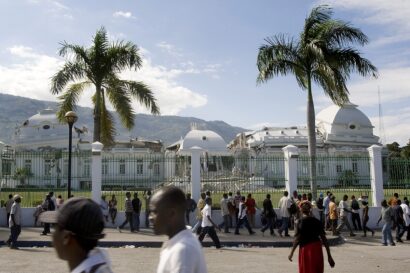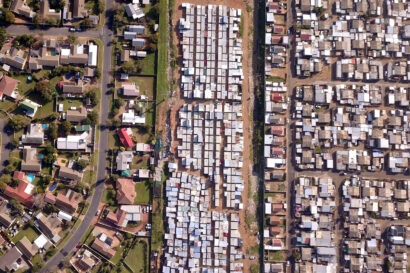The APTI in Madagascar
Much attention has been paid recently to improving local government finances in Madagascar, and enhancing the participation of local governments in mobilising revenue. In October 2017 the Malagasy government invited the African Property Tax Initiative (APTI) to visit Antananarivo to explore ways in which APTI could support the authorities to reform on property tax, and to participate in a conference organized by GIZ on subnational government finance in francophone Africa.
The trip gave an opportunity to get a glimpse of challenges relating to property tax in Madagascar. These appear to be similar to those on much of the continent, and priority areas of work for APTI – including ineffective and incomplete valuation, limited capacity, imperfect collaboration between local and central governments, and weak IT systems. This piece presents those challenges, and examines possible priority areas for reform.
Local government finance in Madagascar: reforms in progress
Decentralisation in Madagascar is generally expected to bring the public administration closer to the country’s citizens and to improve their lives. Current decentralisation laws in Madagascar grant both financial and administrative autonomy to councils, while maintaining the overall control of the central government.
Financial resources available to municipalities are both fiscal (property taxes) and non-fiscal (grants and loans). Power to mobilise local government revenue has been devolved to decentralised territorial collectivities. Investment is emphasised over current expenses when utilising these resources.
Effective mobilisation of property tax is a vital component of the broader objective of municipalities attaining financial autonomy. In accordance with the Tax Code, property tax is charged on all de jure and de facto owners of property – either as a land tax for property without buildings, or property tax for property with buildings. Certain categories of property (e.g. religious and government) are exempt. However, constraints such as unclear tax collection procedures and corruption impede effective mobilisation of property taxes. Recognising these challenges, the government has already begun significant reforms. They include transferring tax mobilisation powers more effectively to the municipal level, establishing greater linkages between the taxes collected and public services rendered, facilitating the transfer of central resources, and creating a local development fund to enhance the management of local government finances.
Similar initiatives are currently being taken by local government institutions to both strengthen property tax collection and increase other sources of finance – central government transfers, and borrowing from either local or international commercial banks.
Key challenges
Despite recent efforts, key stakeholders (Antananarivo city council, fiscal and partner agencies – GIZ, AFD) agree that there are important administrative and technical problems within the property tax system, resulting in poor collection and continued heavy reliance on central government transfers. Property taxes have under-performed since control passed to municipalities. Municipalities have not been entirely transparent in sharing information on actual property tax collection and expenditure with central authorities, which has complicated needs assessment and capacity building.
There are serious problems with the existing valuation system. While fixed amounts ought to be used for property without buildings, and annual rental values for property where there are buildings, the law does not clarify how municipal commissions should compute these rates. This has led to a proliferation of rates across municipalities, and made it harder for the central authorities and international donor agencies to have a clear understanding of their true needs for mobilisation of property tax, and to conceive/deliver any meaningful technical support programmes.
The division of responsibilities between central and local governments has contributed to tensions. For instance, while assessment and collection of property tax has been effectively transferred to municipalities, the DGI retains competence in matters of disputes over property tax. Municipalities view this as a ploy by central government to maintain indirect oversight over their activities, and has been a source of friction.
Key stakeholders also raise the question of political interference. The basis for this concern is embedded in the structure of existing decentralisation frameworks (regions, urban councils, municipalities and Fokontangs). In effect, elected mayors are bound to rely heavily on heads of Fokontangs to implement council action within their communities. However, the latter are appointed officials who report to district administrative officials, arguably permitting the central government to exert some level of indirect oversight over municipal action – including in municipalities held by the opposition.
There is also an absence of effective ICT systems to support property tax collection. Funding by the Germans and French to develop ICT solutions ended prematurely. However, there are some encouraging developments towards using ICTs. In the Fenoarivo Alakamisy Municipality, for example, the mayor is working with universities to build capacity within the locality, and has partnered with major mobile phone operators to facilitate payments of municipal taxes using mobile phones. The government and other municipalities could draw on these experiences as they move to build a comprehensive and efficient ICT system.
Finally, the property ownership and titling system is currently structured in such a way that the standard land titling system (managed by central government authorities) and ownership certificates issued to historic occupants of certain properties (managed by municipalities) run parallel to each other. Although the latter does not amount to a title, it offers similar guarantees. But there are significant risks of fraud and corruption associated with this, since it is managed locally. The lack of coordination between the two systems poses a challenge.
Key areas needing reform
Although it is widely agreed that the existing system for collecting property tax needs improving, the lack of transparency by municipalities has made it difficult to monitor performance and evaluation of previous reforms. Certain key areas need reform:
- Update currently outdated property registers: in city areas like Antananarivo the last census (recensement des biens fonciers) to update the register took place in 1997. There is therefore an urgent need to update the cadaster roll. This is also necessary to clarify the basis for valuation across municipalities, and to assess whether the valuation process is sufficiently simple and transparent.
- Improve collection of property tax, which is weak: in many municipalities collection of property tax is between 20-40% of the estimated While the Antananarivo City Council is able to collect about 60% of its projected revenue, much of this comes from garbage tax. Actual collection of property tax is much lower.
- Tackle lack of capacity in municipalities: there is lack of capacity within municipalities, which has a significant impact on valuation, collection, enforcement and the handling of disputes. This presents a major obstacle to effective mobilisation of property tax. After the DGI took steps to transfer property tax collection to municipalities in 2008, there does not seem to have been much success in building local capacity, and enabling municipalities to shoulder the responsibility for collecting property tax.
- Establish a reliable ICT system to manage collection of property tax: there are no reliable ICT systems or solutions being used in the country today to manage property tax processes. While satellite imagery has been used in the past to identify properties in Antananarivo,[1] the proposed platforms were neither comprehensive nor cost-effective. There is therefore huge potential to support the Madagascar government in this area.
Conclusion
The challenges encountered in Madagascar in relation to valuation, ICTs and central-local collaboration for property tax purposes are far from unique, and the government has shown initiative in seeking to improve outcomes. One of the key goals of APTI is to continue to survey experiences across the continent both to highlight common challenges and point towards potential solutions. Some of the lessons from elsewhere are reflected above: simplify and clarify valuation, improve coordination between the central and local levels, and seek to implement simple and cost-effective ICT options to strengthen administration.
[1] e.g. it has been useful in identifying about 160,000 roofs. The ICT systems have largely not been effective, so the council is caught between increasing tax rates and broadening the tax base, without any viable systems to help it do so.



